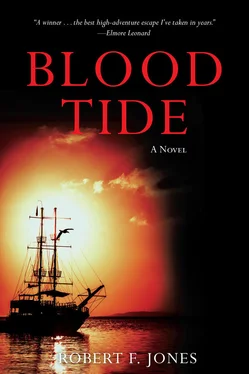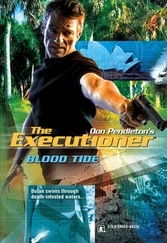Robert Jones - Blood Tide
Здесь есть возможность читать онлайн «Robert Jones - Blood Tide» весь текст электронной книги совершенно бесплатно (целиком полную версию без сокращений). В некоторых случаях можно слушать аудио, скачать через торрент в формате fb2 и присутствует краткое содержание. Год выпуска: 2014, Жанр: Старинная литература, на английском языке. Описание произведения, (предисловие) а так же отзывы посетителей доступны на портале библиотеки ЛибКат.
- Название:Blood Tide
- Автор:
- Жанр:
- Год:2014
- ISBN:нет данных
- Рейтинг книги:5 / 5. Голосов: 1
-
Избранное:Добавить в избранное
- Отзывы:
-
Ваша оценка:
- 100
- 1
- 2
- 3
- 4
- 5
Blood Tide: краткое содержание, описание и аннотация
Предлагаем к чтению аннотацию, описание, краткое содержание или предисловие (зависит от того, что написал сам автор книги «Blood Tide»). Если вы не нашли необходимую информацию о книге — напишите в комментариях, мы постараемся отыскать её.
Blood Tide — читать онлайн бесплатно полную книгу (весь текст) целиком
Ниже представлен текст книги, разбитый по страницам. Система сохранения места последней прочитанной страницы, позволяет с удобством читать онлайн бесплатно книгу «Blood Tide», без необходимости каждый раз заново искать на чём Вы остановились. Поставьте закладку, и сможете в любой момент перейти на страницу, на которой закончили чтение.
Интервал:
Закладка:
The bellow of the jai-alai crowd, louder even than the traffic or the barter market, hit them as they entered. Great fistfuls of pesos changed hand with every smack of the ball on the backboard. The bodyguards pushed ahead and cleared space at the top of the stands. Billy Torres sat on Curt’s right, a bodyguard on his left. The other one stood spraddle-legged behind them, watching the crowd.
“Major Chalmers tells me you’re fluent in Spanish,” Torres said. “It’s better we talk English here. Most Zamboangans speak Chabakano, a kind of bastardized Castilian without the grammar and mixed up with maybe half a dozen other dialects, but they can follow Spanish without any trouble.”
“Your English is very good.”
“I was born and educated in Manila,” Torres said. “And I served for many years in the U.S. Navy.” He shook a cigarette from a pack and offered it to Curt.
“What is that, cloves or something?”
“Kretek cigarettes, from Djakarta,” Torres said, laughing apologetically. “Yes, cloves. You get quite fond of them.”
“Some kid in the park just tried to sell me some as marijuana. Five bucks apiece.”
“The ripoff is the great folk art of these islands, perhaps of all Asia. ‘Here lies a fool who tried to hustle the East.’”
Curt laughed politely.
“You didn’t bring your dog with you today, did you?” Torres sounded almost playful.
“Chalmers tell you about that?”
“Please.” Torres turned sideways on the bench and looked straight into Curt’s eyes. That was the most disconcerting thing about Filipinos. Curt had noticed it everywhere. They watched you so closely while you were talking, sometimes even moving their lips as if they were ventriloquists speaking your lines for you. You could feel them inside your mind, poking around in there. Comfortably. Without a condom. It was a kind of supreme other-directedness, the exact opposite of Western individualism, and it sucked at the soul so that you could not tell them a convincing lie. Malays call this quality lata , and all of them possessed it to one degree or another. Torres had plenty of it.
“Back on the boat,” Curt said at last. “He doesn’t travel well on the beach. I can’t take him anywhere.”
Torres laughed and broke eye contact.
“That was a nice little business you had going off Palawan. Why did you give it up?”
“It was getting a bit old. You can’t work the same scam too often in the same place, and besides, I only did it to get a few bucks ahead. Enough to get me up to Manila and see Phil Chalmers.”
“And why did you come here in the first place—to the Philippines?”
“Well, I was heading farther west, actually. I have some friends in Bangkok”—a bald-faced lie, but Torres wasn’t watching—“and I’d missed out on the great cut-rate cultural tours of Southeast Asia our government offered its young folks back in the sixties and early seventies. Wanted to mesh gears with my peers, you might say.”
Torres chuckled, then bit it off. “You know that your little scam as you call it was conducted in another firm’s sphere of influence? You seem like a bright young fellow. Didn’t it occur to you that by drawing attention to the area through the newspapers, you might force the government to send its navy in after you—start it poking around in the South Sulu? Screw things up for others who might have bigger fish to fry?”
“Well, actually . . .”
“I’m a partner in that firm, Captain Hughes. Frankly, we were very cross with you. We sent out boats to look for you. There are fortunes at stake here that go beyond petty piracy. If we’d found you, you wouldn’t have been eating sotanghon and chatting with baby-faced dope peddlers in the park today. Fortunately for us, your friend Major Chalmers happened to call.” He said something sharp and guttural to the bodyguard at the top of the stands.
Curt felt his scrotum shrink.
“It’s about forty feet from the top of this grandstand to the pavement below,” Torres said. “Be a damn shame if you slipped and fell.”
“Look, I didn’t know,” Curt said. “How could I know there was something else going on down there? I never been here before.”
“Well, then, you’re dumber than you seem,” Torres replied. “But fortunately for you, you have other talents. Chalmers said you’re a good man in a fast boat. I checked on that. You’re well known to certain parties back in the States. You seem to have compiled an impressive offshore racing record, in Cigarettes and Apaches and suchlike, on the Bimini-to-Florida run. A lot of our firm’s business requires swift movement of men and materials from port to port. We deal in perishables.”
“You’re offering me a job?”
“On a probationary basis.”
“Pay?”
“One percent of the cargo value on every successful run. Your room and board will be taken care of.”
“Benefits?”
Torres laughed, slapped Curt on the knee. “An excellent health plan for a man in your enfeebled condition. No physical required. And the best life insurance you could ask for in the Sulu Sea.”
“Okay,” Curt said. “When do I start?”
“You could sell your boat—we’ll handle that for you—and start today.”
“I’d rather hold on to the boat. In case the economy turns down, and anyway, it’s got sentimental value.”
“Up to you. Do you know San Lázaro? It’s on the charts—about two or three days’ sail southwest of Jolo, call it five days from here. I’ll provide you with a crew—Tausuqs, good sailors, nominally Moros but faithful employees of our firm. They’ll keep you clear of the minor-league mundo along the way. You’ll need an advance to top off your fuel and replenish sea stores.” He thumbed an inch of hundred-peso notes off a stack handed him by one of the bodyguards and passed them to Curt. “You ought to realize, of course, that if our board chairman, Commodore Millikan, doesn’t approve of you, the deal’s off. But he usually trusts me on these things. See you next week.”
The three of them pushed down through the milling crowds, with the bodyguards running interference. Curt slipped the money uncounted into his pocket.
San Lázaro bound . . .
SEVENTEEN

From Miranda’s log:
Put into Majuro today—a gunkhole in the true sense of the word—just long enough to top off fuel and water. While Culdee and I did that, Freddie found a phone and tried to raise Padre Cotinho in Zamboanga. Took him half an hour to get through; Padre not there. Had moved on shadowing Curt to some small island group in the SW Sulu Sea—Efemerales, he said, major island, San Lázaro. (Will look for it on the chart tomorrow.) Freddie gave Zambo contact our ETA Philippines. Someone will meet us in Surigao Strait or beyond with latest word on Curt’s track.
Refueled and watered alongside public dock in Majuro’s Old Port—a graveyard of unemployed tankers. Depressing, all those dead ships, all those sailors on the beach. Culdee seemed delighted. “Those bastards will run you down at night,” he said. “They don’t bother to post a lookout, or if they do, he’s probably stoned and freaking to the rock beat on his headset. They’re not ships, they’re oil spills packed in giant sardine cans just waiting to happen. I hope they turn all of ’em into razor blades.” What about the sailors? “They’re not sailors, they’re union members. The only sailors are in small boats like this, or the navy. And there’s not many left in the navy, either.” Some old song. So much for pity.
Cast off last line at 1642, motored out of harbor into stiff onshore winds. Hate to burn fuel but glad to be clear. Venganza smells foul—there’s an oily bathtub ring around her waterline—opened all hatches and aired her out as soon as we made sail. Food prices in the supermarket outrageous, but we bought some fresh fruit from a bum-boat—bananas (red and yellow), guavas, papaya, lemons, grapefruit the size of cannonballs. Also a big slab of turtle steak, so fresh it was still twitching.
Читать дальшеИнтервал:
Закладка:
Похожие книги на «Blood Tide»
Представляем Вашему вниманию похожие книги на «Blood Tide» списком для выбора. Мы отобрали схожую по названию и смыслу литературу в надежде предоставить читателям больше вариантов отыскать новые, интересные, ещё непрочитанные произведения.
Обсуждение, отзывы о книге «Blood Tide» и просто собственные мнения читателей. Оставьте ваши комментарии, напишите, что Вы думаете о произведении, его смысле или главных героях. Укажите что конкретно понравилось, а что нет, и почему Вы так считаете.












